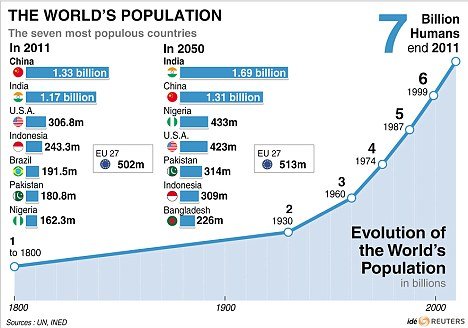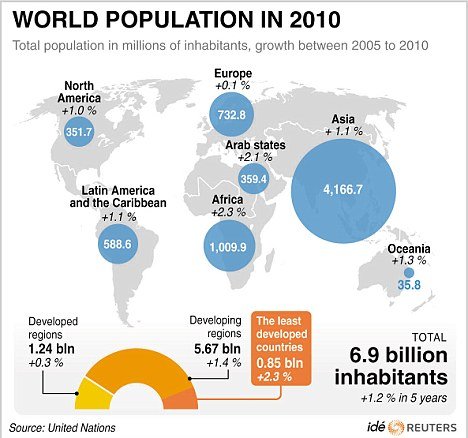United Nations announced that the world’s population will reach 7 billion in the next few days.
The 7 billion stage comes just 12 years since the total world population reached 6 billion and the official estimates show the figure will top 8 billion in 2025 and 10 billion before the end of the 21st century.
United Nations also said that it is most likely the baby will be born in the Asia-Pacific region, where the population growth rate is higher than anywhere else in the world.
According to experts, the pace of growth – which has seen the number of people on the planet triple since 1940 – poses an increasing danger to citizens.
Experts said that will be more people to feed, an increasing need for houses and for medical services, while world’s resources look set to come under more strain than ever before.

As populations stabilize in the industrial world, almost all growth in the near future is expected to take place in developing countries.
United Nations believes that of the 2.3 billion people will be added by 2050, more than 1 billion will live in sub-Saharan Africa and that the Indian subcontinent will add some 630 million people.
Less land and water will be available for each person and poorer people, who tend to depend more on natural resources, will bear the brunt as they will not be able to compete with the rich.
The biggest world problem will be how to feed the new people.
Ageing populations are also a big issue for some industrial countries, such as Japan, nearly doubling its share of the population aged 65 and over in the past 20 years.
This will be reflected in increased pressure on pension and healthcare systems.

The United Nations report states: “Another two billion people may be added to the world population by mid-century, many of them in places where hunger, poverty, and environmental degradation are already taking a high toll.
“Supporting the world’s human population will mean eliminating poverty, transitioning to an economy that is in sync with the earth, and securing every person’s health, education, and reproductive choice.
“If we do not voluntarily stabilize population, we risk a much less humane end to growth as the ongoing destruction of the earth’s natural systems catches up with us.”
According to Under-Secretary-General of the United Nations, Dr. Noeleen Heyzer, the 7th billion child of the world has a better chance of surviving past the age of 5 than 10 years ago.
The life expectancy for both women and men has also increased in every Asian and Pacific country during the last 10 years, Dr. Noeleen Heyzer added
In 2011, the pace of development is 1.1%, meaning an extra 78 million people will live on the planet by the end of this year, but it has slowed down slightly from its peak of 2% in 1968.
[youtube Fwp5TMoxs1o]
